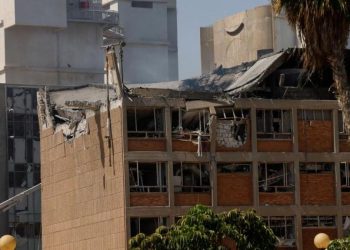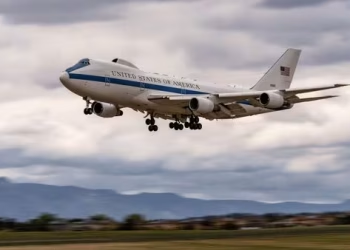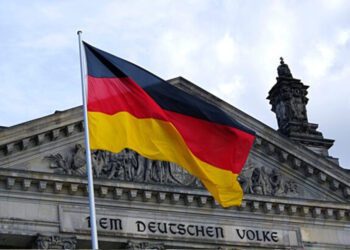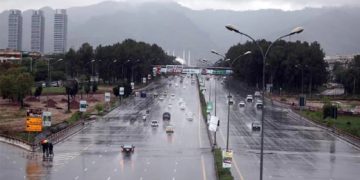As the Middle East descends into a perilous new phase of war, the escalating conflict between Israel and Iran has left the world watching with anxious eyes and clenched fists.
On the surface, it appears to be a direct military standoff between two long-time adversaries. But beneath the rising smoke and rubble lie the unmistakable fingerprints of global power brokers, particularly the United States. This is not just Israel versus Iran — it is a flashpoint in a global struggle for power, ideology, and influence. And if the world fails to act with urgency and integrity, the fire could spread well beyond the borders of Tehran or Tel Aviv.
On June 16, 2025, Iran launched its fourth wave of retaliatory missile attacks on Israeli cities, including Tel Aviv, Petah Tikva, and Haifa. At least five civilians were killed, and dozens more wounded. This came in response to Israel’s massive aerial campaign — code-named Operation Rising Lion — which has killed between 220 and 400 Iranians, many of them civilians and scientists, and left much of Tehran on edge. Thousands of residents have fled the Iranian capital in fear of continued drone and missile bombardments, while fires rage at vital oil depots and military complexes.
Israel has declared that it now possesses “aerial superiority” over western Iran. That claim, however, rests heavily on a foundation laid in Washington. Israel’s advanced weapons systems, intelligence networks, satellite guidance, cyber-attack capability, and refueling logistics are all underpinned by U.S. support. Without these, targeting deeply buried Iranian nuclear facilities and achieving such sweeping operational success would be logistically improbable. Former U.S. President Donald Trump’s denial of American involvement, followed by his stark warning that “if U.S. facilities are attacked, America would respond with full force,” exposes the contradiction at the heart of Washington’s position: a disingenuous denial coupled with unmistakable complicity.
Israel’s campaign is not merely about defending itself from perceived nuclear threats — it is about dismantling Iran’s regional influence and weakening its clerical regime. Iran has long been the West’s most defiant adversary in the Middle East, resisting integration into the liberal international order. With its nuclear ambitions, support for regional militias, and iron grip on domestic dissent, Tehran has remained a thorn in the side of Western interests.
This latest conflict appears tailored to accelerate a long-held ambition: regime change. The surgical strikes against high-profile scientists, military figures, and strategic infrastructure speak to an intention not just to degrade capability but to shake the foundation of Iran’s leadership. Intelligence leaks from within Iran — possibly from moles embedded in key institutions — only amplify this narrative of internal corrosion. The regime, increasingly unpopular due to years of sanctions, repression, and broken promises, now finds itself fighting on two fronts: against Israeli jets from above and growing domestic unrest from within.
Europe, too, has revealed its hand — not through action but inaction. EU leaders have limited themselves to issuing bland calls for “non-escalation,” stopping short of any meaningful condemnation. Their diplomatic restraint reads as quiet approval of Israel’s actions, suggesting alignment with the Western objective of softening or even toppling the Iranian regime.
Meanwhile, global public opinion has taken a markedly different tone. From Asia to Latin America, and across much of the Muslim world, voices are growing louder in condemnation — not just of Israel’s actions but of the duplicity that enables them. Millions are urging their governments to take bold and decisive action to rein in Israeli aggression, which is increasingly seen as a threat to regional and even global stability. The cry is not for retaliation but for justice and balance — a call to “cut Israel down to size,” diplomatically and economically, to force it back from the edge of permanent militarism.
Perhaps the most honest assessment came from Pakistan’s Defence Minister Khawaja Asif, who warned in his June 14 address to the National Assembly: “If today is Iran, tomorrow it may be Pakistan or any other Muslim country.” His words ring with urgency and historical resonance. The current war should not be viewed as an isolated conflict — it is part of a pattern in which Muslim countries that resist Western or Israeli interests are systematically targeted, either militarily or economically.
Asif’s call for Muslim nations to reassess their diplomatic ties with Israel is both timely and necessary. Maintaining relations with a state that initiates unilateral aggression against a fellow Muslim country without consequence sends the wrong message: that economics trump ethics, and politics override principles of sovereignty and solidarity.
The road ahead is perilous. Should Iran escalate further by attacking Israeli or U.S. assets directly, the region could tip into a full-blown war. Iranian-aligned militias like Hezbollah and the Houthis are already mobilizing. A single miscalculation could ignite a wider conflagration, drawing in Saudi Arabia, Turkey, the Gulf states, and beyond.
Conversely, if Iran chooses to absorb the damage without a kinetic response, it risks not only looking weak but also inviting future strikes. A passive Iran may embolden both Israel and its allies, eroding any remaining deterrent and deepening its internal fractures.
This is where the United States must make a fateful choice: Does it wish to remain a participant in war or emerge as a broker of peace? Its credibility now rests not in its military might but in its willingness to tell the truth, restrain its allies, and open space for diplomacy. The current duplicity is untenable — it fosters instability, stokes extremism, and weakens any pretense of moral authority.
The Iran-Israel war is not just a regional feud — it is a global flashpoint. And the tragedy would be immeasurable if the world failed to act with conscience and clarity. The Muslim world, in particular, must recognize the writing on the wall: Unity is no longer a rhetorical ideal — it is a strategic imperative.
If Iran collapses under the weight of missiles and manipulation today, the chain reaction could touch every border, every mosque, every conscience. The fire lit in Tehran may not be extinguished before it reaches Karachi, Riyadh, or Cairo.
The time to act is now, for all the nations together, to combat the US-backed Israel’s state terrorism — not through vengeance or escalation, but through an unwavering commitment to justice, sovereignty, and peace. Because if Iran is today’s battlefield, tomorrow’s target could be much closer to home.
Sources:
-
The Guardian (June 16, 2025): “Explosions heard over Tel Aviv as Israel responds to Iran’s latest attack.”
-
Reuters (June 16, 2025): “Tehran under fire, Israeli airstrikes devastate key Iranian infrastructure.”
-
Al Jazeera, CNN, Deutsche Welle – Ongoing coverage of Iran-Israel conflict.
The writer is an Executive Director, Devcom Centre for Geopolitical Studies, development expert and policy analyst focused on regional cooperation and climate diplomacy. His email: devcom.Pakistan@gmail.com





























